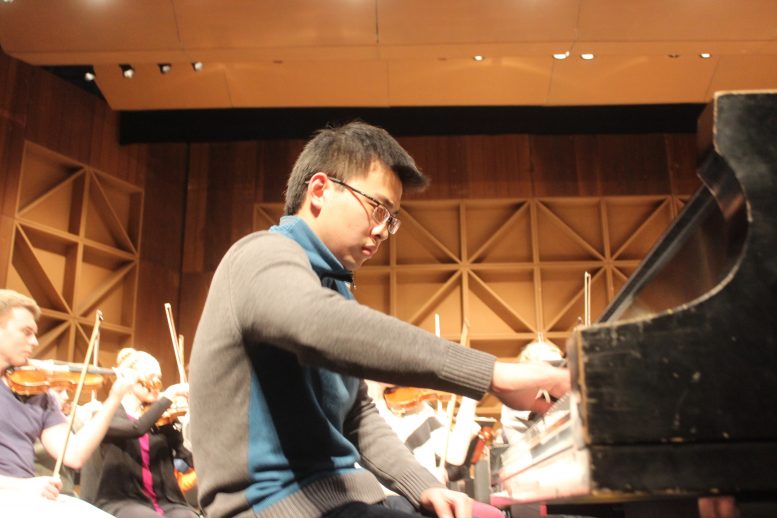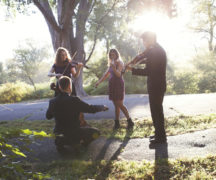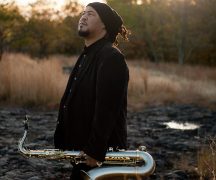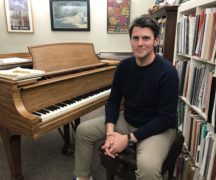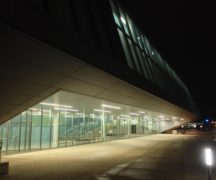By DAVID DUPONT
BG Independent News
Long before the winners of the Competitions in Musical Performance step on stage in front of the Bowling Green Philharmonia, they need to strike up a relationship with the composition to which they want to devote a chunk of their lives.
That means hundreds of hours of practice, then additional hours rehearsing with an accompanist before the December competition where they have their short time on stage during the semifinal and finals rounds until they hear the full force of an orchestra at their back.
On Sunday at 3 p.m. that work will come to fruition on the Kobacker Hall stage during the annual Concerto Concert. Four musicians, two graduate students and two undergraduates, were selected from a field of 87 competitors back in December.
Pianist Zhanglin Hu will open the concert with one of the war horses of classical literature. The sophomore piano performance major will perform the first movement of Beethoven’s “Emperor” Concerto. Hu said he and his teacher, Robert Satterlee, selected the piece because its grandeur and majesty fit Hu’s style. Having the support of the orchestra only accentuates those qualities, he said.
“With the orchestra you can hear a lot of different voices,” he said. “The orchestra produces a richer sound.” That means as a soloist he must invest “more and more energy into his playing.”
Hu said that he enjoyed working with the conductor Robert Jay Garza III, who brought his own ideas to the table. “The concerto is the story between the orchestra and piano,” Hu said.
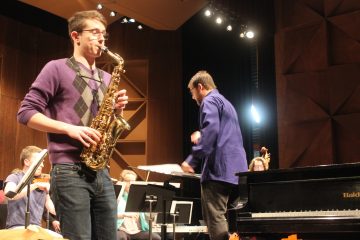
Andrew Hosler with conductor Alexander Popovici
Saxophonist Andrew Hosler has a much smaller ensemble behind him for Walter Mays’ “Concerto for Alto Saxophone and Chamber Ensemble.”
The ensemble has a dozen winds, strings, percussion, and organ. Hosler said some string parts can be doubled to make the orchestra larger but he and conductor by Alexander Popovici opted to stay with the original, spare orchestration.
The piece, the sophomore explained, requires great interplay between the ensemble and the soloist. It does not have an actual meter, instead the performers have freedom to determine how long each segment can take, so he finds himself adjusting his tempo to match the flow of the ensemble.
He heard part of a recording of the piece played by his teacher John Sampen, who commissioned it in 1974. Hosler knew he wanted to perform it. “Only a handful of people have played it,” he said. “I want to be able to play it so people can hear it.”
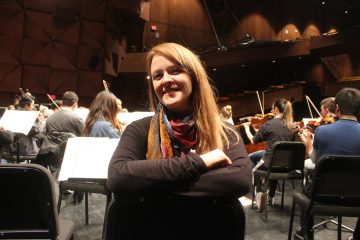
Caroline Kouma
As a singer soprano Caroline Kouma will perform several arias from different composers instead a concerto. The arias she and her teacher Sujin Lee selected reflect a variety of characters. That means Kouma must be an emotional chameleon over the course of the performance.
The aria by Franz Lehar, “My lips fiery kiss” in English, “is really fun,” Kouma said. “It’s something that’s going to be an audience pleaser.”
Antonin Dvorak’s aria, translated as “Moon in the Deep Sky,” “is absolutely beautiful.”
“It sounds simple, but it’s simply stunning,” she said. She’s sung it previously with success at the Metropolitan Opera regional auditions.
Mozart’s “Come scoglio (like a rock)” is the Act 1 soprano aria from “Cosi fan tutte.”
“It is absolutely showy, the diva moment,” she said. Kouma, a first year master’s student, will perform Mozart aria in context when College of Musical Arts stages the opera this spring.
Having the orchestra at her back, rather than at her feet in the pit changes the dynamic of the performance. “It’s louder.” It also changes her interaction with the conductor Maria Mercedes Diaz Garcia.
“It’s thrilling. You feel a little more like you’re inside the orchestra.”
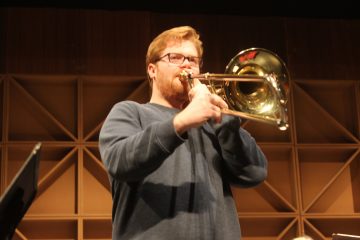
Kyle McConnell
Being inside the orchestra is a feeling trombonist Kyle McConnell knows well. Last year he was in the trombone section supporting the concerto winners. Now he’s out front performing Concerto for Trombone and Orchestra by Ferdinand David, conducted by Yabetza Vivas-Irizarry.
McConnell, a second year master’s student, has been playing the concerto a lot as he auditions for summer residencies and ensembles. It’s a standard for trombonists. It is also an outlier as an early Romantic composition for the instrument. Little was written for solo trombone prior to the mid-20th century. This concerto was supposed to be written by Felix Mendelssohn, but he passed it along to his student, McConnell said.
McConnell, who studies with Brittany Lasch, said the piece requires virtuosity with “some flashy scales and arpeggios.” But more than that, he said, “I’m trying to bring a beauty and elegance to the sound of the instrument.”

